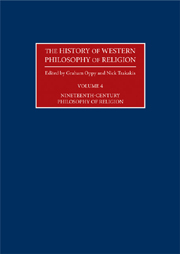Book contents
- Frontmatter
- Contents
- Editorial Introduction
- Contributors
- 1 Nineteenth-Century Philosophy of Religion: An Introduction
- 2 Johann Gottlieb Fichte
- 3 Friedrich Schleiermacher
- 4 G. W. F. Hegel
- 5 Friedrich Schelling
- 6 Arthur Schopenhauer
- 7 Auguste Comte
- 8 John Henry Newman
- 9 Ralph Waldo Emerson
- 10 Ludwig Feuerbach
- 11 John Stuart Mill
- 12 Charles Darwin
- 13 Søren Kierkegaard
- 14 Karl Marx and Friedrich Engels
- 15 Wilhelm Dilthey
- 16 Edward Caird
- 17 Charles S. Peirce
- 18 Friedrich Nietzsche
- 19 Josiah Royce
- 20 Sigmund Freud
- 21 Émile Durkheim
- Chronology
- Bibliography
- Index
12 - Charles Darwin
- Frontmatter
- Contents
- Editorial Introduction
- Contributors
- 1 Nineteenth-Century Philosophy of Religion: An Introduction
- 2 Johann Gottlieb Fichte
- 3 Friedrich Schleiermacher
- 4 G. W. F. Hegel
- 5 Friedrich Schelling
- 6 Arthur Schopenhauer
- 7 Auguste Comte
- 8 John Henry Newman
- 9 Ralph Waldo Emerson
- 10 Ludwig Feuerbach
- 11 John Stuart Mill
- 12 Charles Darwin
- 13 Søren Kierkegaard
- 14 Karl Marx and Friedrich Engels
- 15 Wilhelm Dilthey
- 16 Edward Caird
- 17 Charles S. Peirce
- 18 Friedrich Nietzsche
- 19 Josiah Royce
- 20 Sigmund Freud
- 21 Émile Durkheim
- Chronology
- Bibliography
- Index
Summary
Charles Robert Darwin (1809–82) is rightly known as the father of evolutionary theory. In his great book On the Origin of Species (hereafter Origin), published in 1859, he made the idea of evolution – gradual descent by law-like means from primitive beginnings – virtually commonsensical. At the same time, he offered a mechanism, natural selection, that is today recognized as the chief force driving evolution. But his work was much more than purely scientific. It had implications throughout Western culture, most especially in religion. Let us start with a brief sketch of Darwin's ideas and then turn to religious questions: revealed religion, natural religion, and humankind.
Darwin himself described the Origin as “one long argument”, but truly it falls into three parts (Ruse 2008). First, Darwin talked about the success of animal and plant breeders, and showed how they achieve their ends by choosing or selecting and then breeding from the forms that have the features they desire. Then, secondly, Darwin argued that there is an analogous process in the natural world. This comes about because (as the Reverend Robert Malthus had pointed out at the beginning of the nineteenth century) there is a constant pressure brought on by the greater capacity of organisms to reproduce over their abilities to find food and space.
- Type
- Chapter
- Information
- The History of Western Philosophy of Religion , pp. 161 - 174Publisher: Acumen PublishingPrint publication year: 2009



